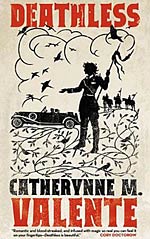
![]() Thomcat
Thomcat
1/13/2013
![]()
Catherynne Valente's Deathless is so much more than a Russian fairy tale history of growing up and growing old.
The structure of Russian folk tales is the first thing we encounter. Familiar characters are here (Baba Yaga, Father Frost, and of course Koschei the Immortal) and familiar themes (birds, objects that summon others, and repetition in threes). The protagonist Marya Morevna has her own Russian folk tale lineage, as the queen or warrior princess of her own province of historical Russia.
Through the marrying of Marya's sisters, we first encounter history – the first sister married to a member of the Tsar's guard, the second to a member of the White Guard, and the third to an officer in the Red Army. Later chapters go further into the early history of Soviet Russia, and that adds to both the history and the folk tale.
Satire of Soviet Russia factors in also, with "Chairman" Yaga, a scarf of the Red Pioneers, and a whole section set in the dream village of Yaichka, where Josef and Leon make trouble for Vladimir Ilyich by ruining the roses. When Vladimir discusses this with neighbor Nikolai Aleksandrovich, he "laughed and sent old Vova on his way, his sympathies being rather with the roses."
Except for a few italicized portions, the story is told from the perspective of Marya, and history flows around her story from youth in Tsarist Russia to old age in 1952. Marya is from and returns to St. Petersburg / Petrograd / Leningrad, and the 900 day Siege of Leningrad plays a major role in the latter part of this story. As she grows, she learns many things and collects the wisdom of many around her, along with a few items of folk tales. The wisdom and items come back to help her in the end, as you would expect.
An underlying theme shows that this is more than just a story, it is both history and destiny. There is a sense that the story has played out many times before and will keep playing out until it is perfected. Did Marya's choices perfect it this time? Is the end result the best of worlds or the worst? This inevitability is another recognizable Russian trait.
All in all, I enjoyed this story of growing up and growing old. At times it was a little rough – perhaps those were the transitions between historical eras, where the folk tales were the least evident. Catherynne Valente has put together a very good tale – 4 ½ red stars.